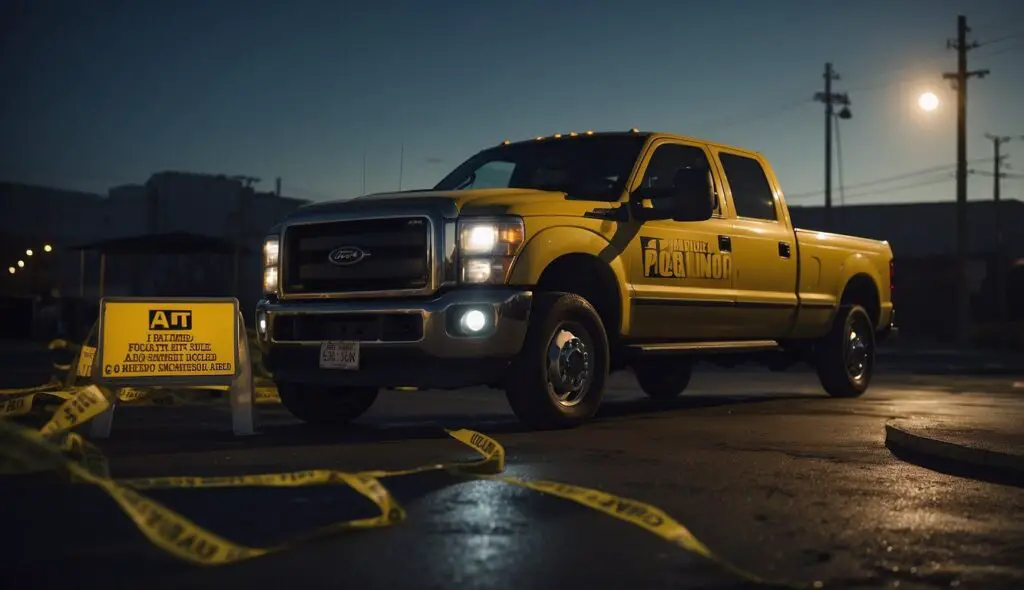Driving with a deleted truck might seem tempting for numerous reasons, from improved performance to higher fuel efficiency. Getting caught with a deleted truck, however, carries severe consequences, including hefty fines, impounded vehicles, and even criminal charges. These penalties apply to both individual truck owners and companies, making it a risky decision.

When law enforcement or the EPA discovers a truck with tampered emissions equipment, fines can range from $2,500 to $7,500 for consumers and up to $14 million for companies. On top of that, your truck might fail mandatory inspections, leading to further complications. If you use your truck for business, this could result in significant disruptions and financial losses.
Besides legal issues, driving a deleted truck can also void your warranty. This means you’ll be out-of-pocket for any repairs, which can add up quickly. Make sure you understand the risks involved, as the potential drawbacks often outweigh the benefits.
Legal Implications of Deleting a Truck

Deleting a truck can result in significant legal repercussions. These include penalties from federal and state authorities, financial fines, and potential jail time for serious offenders.
Federal and State Laws
According to federal law, specifically the Clean Air Act, modifying or removing emissions equipment from your truck is illegal. This law is enforced nationwide by the EPA, making it a federal offense to have a deleted truck.
Different states have their own stricter regulations and penalties for tampering with emissions controls. For example, California, known for its stringent environmental laws, has particularly harsh penalties. Similarly, Texas enforces strict emissions regulations with substantial fines for violations.
Potential Fines and Penalties
If you are caught with a deleted truck, you can face substantial fines. The EPA can impose fines ranging from a minimum of $2,500 to a maximum of $7,500 for individuals. For commercial entities, these fines can reach up to $14 million depending on the severity of the violation.
Local authorities also impose additional fees and penalties. These fines extend beyond just the driver, often holding companies accountable as well.
Jail Time for Serious Offenses
In addition to monetary penalties, serious offenses can lead to jail time. If the EPA police find that tampering with emissions systems was intentional and had significant environmental impact, criminal charges can be pursued.
While jail sentences are less common, they are possible, particularly for repeat offenders or in cases involving large-scale violations. This adds another layer of risk for those considering deleting their truck’s emissions controls.
Environmental and Health Impact

Driving a truck with its emissions control system deleted can lead to serious problems for both the environment and human health. Key areas affected include increased air pollution and broader environmental damage.
Air Pollution from Deleted Trucks
Deleted trucks contribute significantly to air pollution. Without the emissions control system, these trucks release harmful particulates and gases directly into the atmosphere.
One major issue is the lack of a diesel particulate filter (DPF). The DPF is designed to trap and burn off particulate matter before it can exit the exhaust system. Without it, your truck releases diesel soot, which contains fine particles that can penetrate deep into your lungs.
Another critical component is the reduction of NOx gas emissions. NOx gases are produced during the combustion process and are known to cause respiratory problems and contribute to the formation of smog. An emissions-deleted truck can release large amounts of NOx, increasing the risk of lung diseases and other health issues.
Contribution to Environmental Pollution
When emissions controls such as the DPF and other devices are bypassed, your truck becomes a significant source of environmental pollution. This affects plants, wildlife, and ecosystems.
Deleted trucks emit higher levels of harmful particulates. These particles settle on plants, water, and soil, eventually entering the food chain. This can pose a risk to animals that ingest contaminated plants and water.
Moreover, increased emissions contribute to acid rain, which harms forests, rivers, and lakes by changing the pH balance of the environment. This can lead to the death of aquatic life, forest damage, and soil degradation.
Driving a truck without proper emissions control not only risks hefty fines but also causes long-lasting damage to the world around you. Keep your vehicle compliant to protect both your health and the environment.
Performance and Efficiency Concerns

When considering a deleted truck, it’s important to look at both performance gains and potential drawbacks. You might see some improvements, but there are also significant concerns regarding efficiency and maintenance.
Engine Power and Fuel Efficiency
Some owners believe that deleting emissions systems like the DPF or EGR will boost their diesel truck’s power. By removing these systems, your truck may show an increase in horsepower and possibly better throttle response. This can make your truck feel more powerful and responsive.
Fuel efficiency could also improve in some cases. Without the DPF system clogging and regenerating, your diesel truck might consume less fuel. This can give you more miles per gallon, especially during highway driving.
However, modern emissions systems are designed to work with your engine’s operation. Removing these systems can lead to unforeseen issues. While you might gain some power and efficiency short-term, you could face long-term problems that outweigh these initial benefits.
Maintenance and Repair Costs
You might think that a deleted truck will require less maintenance since you’re removing complicated systems like the EGR. It is true that you will no longer need to perform DPF cleanings or EGR repairs, which can save you some money.
However, a deleted truck can face unexpected mechanical issues. These emissions systems also help control your engine’s temperature and reduce stress on its components. When they are removed, your engine might overwork and break down more often.
Moreover, the costs for repairs without a warranty can be high. Since deleting emissions controls can void your warranty, you could end up paying thousands of dollars for engine repairs if something goes wrong. This makes maintaining a deleted truck potentially more expensive in the long run.
Risks to Owners and Businesses

Owning and operating a deleted truck comes with serious risks. You could face issues with your warranty and resale value, and shops and tuners involved in the process may also encounter legal problems.
Impact on Warranty and Resale Value
If you delete your truck, the manufacturer will likely void your warranty. This means you are responsible for all repairs, which can be very costly. Even minor fixes can add up quickly without a warranty.
Resale value is another concern. Dealers often refuse to accept deleted trucks as trade-ins. This is partly because it is illegal to sell a deleted truck. Additionally, potential buyers are often wary of the legal and mechanical risks associated with deleted trucks.
Liability for Shops and Tuners
Shops and tuners who delete trucks can face serious legal consequences. They may be fined heavily for violating federal and state laws. For instance, fines can reach up to $14 million for companies.
Liability extends beyond fines. Shops and tuners might face legal action from consumers if the modified trucks cause accidents or mechanical failures. This legal risk can harm their reputation and result in business losses. Therefore, careful consideration is required before offering these services.
Compliance and Alternatives to Deleting
Complying with emission laws is essential to avoid fines and other penalties. There are also legal alternatives to deleting emission systems such as the DPF and DEF systems, which help keep your truck running efficiently while meeting regulations.
Emission Testing and Certification
Emission testing is required to ensure that your truck meets federal and state standards. You will need to bring your vehicle to an approved facility where they will run emission tests to check pollutants like nitrogen oxides and particulate matter.
If your truck fails the emissions test, you may need to repair or replace parts like the catalytic converter or DPF. In some cases, your truck may need to be recertified to get a new emission label after making necessary updates. Some states offer a waiver if the cost of repairs exceeds a certain amount.
These tests prevent excessive pollution and keep your truck street-legal, avoiding the severe consequences associated with being caught with a deleted truck.
Legal Alternatives for Emission Control
Instead of using delete kits to bypass emission controls, consider legal alternatives. Regular maintenance of your truck’s DEF system and DPF can ensure they work properly. Using high-quality software updates from the manufacturer can also optimize emissions without breaking laws.
You might also explore aftermarket products that improve efficiency while complying with emission standards. These can include better air filters, upgraded catalytic converters, or performance tuning that doesn’t surpass legal limits.
While these options require an investment, they keep your truck compliant, avoiding fines and impoundments. Legal alternatives ensure your truck remains in good condition and helps the environment.

